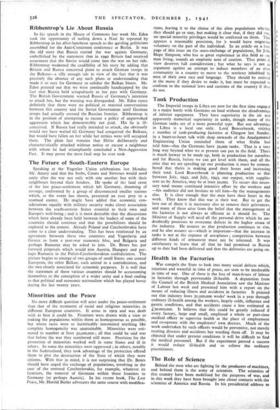Minorities and the Peace
No more difficult question will arise under the peace-settlement than that of the treatment of racial and religious minorities in different European countries. It arose in 1919 and was dealt with as best it could be. Frontiers were drawn with a view to making the populations within them as homogeneous as possible, but where races were so inextricably intermixed anything like complete homogeneity was unattainable. Minorities were esti- mated to number at least 30,00o,000 ; all that could be said was that before the war they numbered still more. Provision for the protection of minorities worked well in some States and ill in others. In some the minorities were opprcssed ; in others, notably in the Sudetenland, they took advantage of the protection offered them to plot the destruction of the State of which they were citizens. With that in mind, it is not surprising that Dr. Benes should have urged the exchange of populations, involving in the case of the restored Czechoslovakia, for example, whatever its frontiers, the removal of Germans within those frontiers to Germany (or perhaps Austria). In his recent book, The Lost Peace, Mr. Harold Butler advocates the same course with modifica- lions, leaving it to the choice of the alien populations whether they should go or stay, but making it clear that, if they did stay, no special minority privileges would be conferred on them. That appears a reasonable provision, for it would leave migration voluntary on the part of the individual. In an article on a later page of this issue on the mass-exchange of populations, Sir John Hope Simpson, who has as great experience in this field as any man living, sounds an emphatic note of caution. That point of view deserves full consideration ; but what he says is not an argument against an attempt to induce members of an alien community in a country to move to the territory inhabited by men of their. own race and language. They should be assisted in the move if they desire to make it, but must be expected to conform to the national laws and customs of the country if they do not.






















 Previous page
Previous page